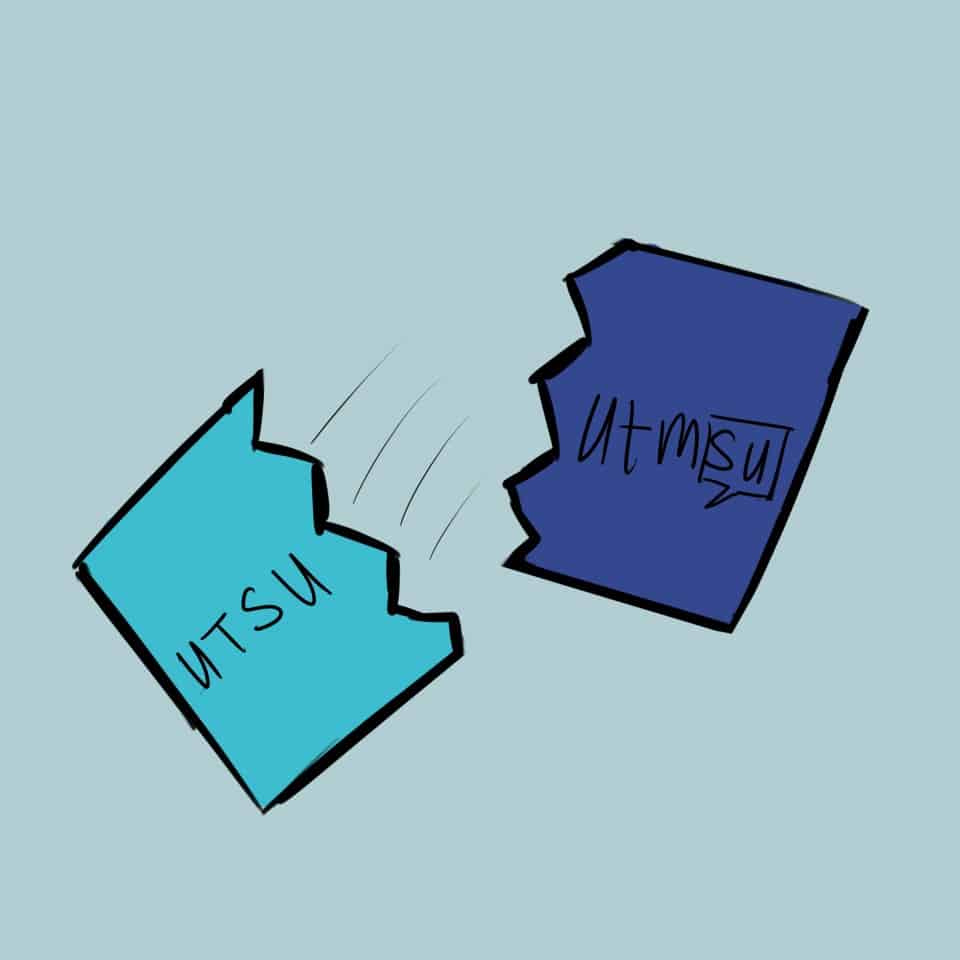[dropcap]The[/dropcap] University of Toronto Student’s Union (UTSU) Annual General Meeting (AGM), which took place on October 7, occurred during the last legs of Mercury’s retrograde cycle, which is a notably disadvantageous time for anything concerned with communication, details, and clarity. It is a time, astrologically speaking, of misinformation, foiled plans, and exposed errors. Indeed, students spent hours in a hostile environment where the most important item on the agenda — establishing a new Board of Directors structure — failed to pass.
As AGMs are one of the only ways the University of Toronto Mississauga Student Union (UTMSU) and the UTSU can come together on political governance matters, the experience of this past AGM is as good an opportunity to reflect on the current relationship between the two political entities. The relationship between the UTMSU and the UTSU is the institutional equivalent of an angst-ridden long-distance relationship, like staying together with a grade 12 boyfriend who goes to school in the States, and only has time to Skype every other weekend. Each partner has a life that exists almost entirely independently of the other, and on the rare occasions when they do intersect, it feels strained and useless.
The UTMSU fee diversion arrangement sees UTM students put money into the UTSU, and then have their funds almost entirely returned to them, and managed as the UTSMU sees fit. This makes sense at face value, since UTM is geographically separate from the St. George campus, and its leadership knows its students’ needs far better than those at the downtown campus could ever hope to.
But if the UTMSU is run by a network of largely competent and politically progressive individuals who are devoted to improving their campus and providing for their constituents, then why does it need the UTSU as a babysitter? The vestigial, paternalistic presence of the UTSU operates as a formality. Worse, it seems to be producing more harm than good — apart from stalling the administrative evolution of the Board of Directors, UTM and St. George students are often pitted on opposite ends of the AGM debate, fracturing our already fragile university identity.
So the question here is not whether UTM students are part of the UTSU, or whether or not they should be represented. It is currently a fact that the UTMSU is part of the UTSU, and within this structure, UTM students would deserve, require, and demand effective representation.
Rather, the question is a further step back: should the UTSU and UTSMU even stay together? Since the UTMSU already runs itself, it shouldn’t need to be subjected to these yearly spectacles of privilege and disdain; there is no point for a body to decide the future of issues that only affect it tangentially.
[pullquote]Should the UTSU and UTSMU even stay together?[/pullquote]
With many relationships, two partners can both be wonderful people and yet keep falling into petty fights and protracted arguments. The things they need from a relationship aren’t being offered, or the things they value aren’t shared by their partner, or what once felt like a real lasting connection has become rare moments few and far between.
Such is the status of UTSU and UTMSU’s current relationship. If the AGM was any indication, many members at UTM and UTSG hold drastically different ideas about the purpose, interests, and applicability of items as basic as their organizational structure. These different ideas can have dramatic spoiling effects on the future of the UTSU.
As such, in light of the approaching SGM, we should ask ourselves if this is an institutional arrangement that offers any tangible benefits in return for a confusing unhappy marriage between two functionally and geographically distinct unions. Maybe we can look back on this past period of Mercury and ask ourselves if we’d be better off just staying friends.
Alex Verman is a fourth-year student at New College studying political science. He is a member of the ASSU executive. The views expressed here are his own.


